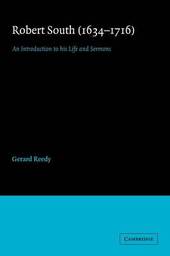
|
Robert South (1634-1716): An Introduction to his Life and Sermons
Paperback / softback
Main Details
| Title |
Robert South (1634-1716): An Introduction to his Life and Sermons
|
| Authors and Contributors |
By (author) Gerard Reedy
|
| Series | Cambridge Studies in Eighteenth-Century English Literature and Thought |
|---|
| Physical Properties |
| Format:Paperback / softback | | Pages:192 | | Dimensions(mm): Height 228,Width 151 |
|
| Category/Genre | Literary studies - c 1500 to c 1800 |
|---|
| ISBN/Barcode |
9780521041768
|
| Classifications | Dewey:283.092 [B] 283.092 |
|---|
| Audience | | Professional & Vocational | |
|---|
| Illustrations |
Worked examples or Exercises
|
|
Publishing Details |
| Publisher |
Cambridge University Press
|
| Imprint |
Cambridge University Press
|
| Publication Date |
10 September 2007 |
| Publication Country |
United Kingdom
|
Description
Robert South (1634-1716) was one of the great Anglican writers and preachers of his age. A contemporary of Dryden and Locke, he faced the profound political and philosophical changes taking place at the beginning of the Enlightenment in England. With the interdependence of Church and State forcing a conjunction of religious and political issues, South's life and work as a preacher show him reacting to changes in civil and ecclesiastical polity over the course of his active public life. Gerard Reedy's book, the first major study of South, makes a strong case for the importance of his sermons, their complexity, beauty and wit, and their place in the history of post-Restoration English literature. Discussing sermons of South which deal with his theory of politics, language, the sacrament and mystery, Reedy reintroduces us to a lively and seminal master of prose, politics and theology in the late Stuart era.
Reviews"Reedy has done all students of English Renaissance literature and religious history a great service through his careful delineation of South's homiletic achievement. His volume is modest in size, but it demonstrates the importance of South's work and captures significant dimensions of his thought, surely prompting others to further study." John N. Wall, Theological Studies
|